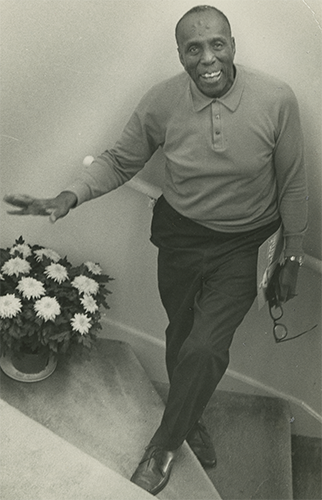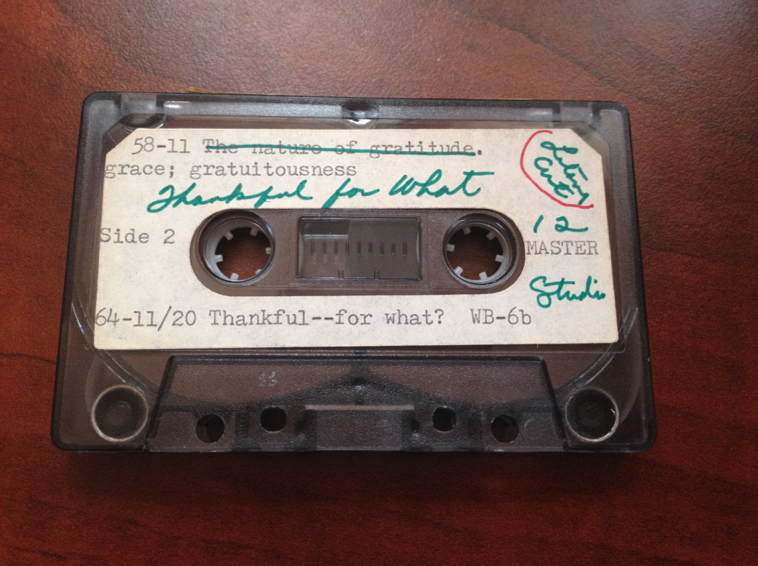Project Overview
The Howard Thurman Digital Archive highlights materials in Pitts Theology Library related to Thurman's life, particularly audio recordings of Thurman's sermons, speeches, lectures, and interviews. The audio available on this site has been transcribed so that listeners can follow along as Thurman speaks and jump ahead to specific sections of the audio.
Future components of the project include a map of Thurman's activities from the 1950s to the 1980s and topical exhibits that provide selected recordings and commentary about their impact.
A full list of the audio recordings held in Pitts Theology Library is provided in our archival finding aid. Please note that recordings will be published on a rolling basis as they are fully processed. If you would like researcher access to the unprocessed audio recordings, please contact us directly.
Project Team (past and present)
Bo Adams, Project Manager
ShaCarolyn Halyard, Researcher
Rodell Jefferson III, Researcher
Gene Lee, Content Editor
Dustin Mailman, Researcher
Anne Marie McLean, Designer
Tim Rainey, Researcher
Spencer Roberts, Project Manager and Developer
Brandon Wason, Metadata and Researcher
About The Collection
In 2010, the family of Howard Thurman (1899-1981) donated to Pitts Theology at Emory University a large collection of audio and video materials, formerly held by the Howard Thurman Educational Trust. The collection includes over 1,400 individual recordings, totaling over 41,000 minutes of audio and video. Most of the recordings are on audio cassette, with some additional recordings on reel-to-reel audio. The small video collection is on 16mm film.1 The recordings date from 1951 through 1982, covering much of Thurman’s public career. Most of the recordings are of Thurman himself, being interviewed, delivering lectures, or offering sermons.
About Howard Thurman

Howard Thurman (1899-1981) was a theologian, preacher, educator, author, and civil rights leader. After receiving his bachelor’s degree at Atlanta’s Morehouse College and his bachelor of divinity degree at Rochester Theological Seminary, Thurman served as an administrator and teacher at Spelman College, Morehouse, Howard University, and Boston University.2 In 1944, Thurman co-founded the Fellowship Church for All Peoples in San Francisco, America’s first interracial and multi faith congregation. Thurman wrote more than 20 books and is celebrated as one of the most influential preachers and theologians of the 20th century.
Why Pitts Theology Library
Though Thurman did not spend time at Emory University as a student, faculty member, or administrator, Candler School of Theology at Emory has developed as a major center for the study of Thurman's life and works. Much of this reputation is due to the work of Luther E. Smith, Jr., Professor Emeritus of Church and Community. Prof. Smith, who taught at Candler for many decades, has been recognized as a leading scholar on Thurman, having published acclaimed books including Howard Thurman: Essential Writings (Orbis, 2006) and Howard Thurman: The Mystic as Prophet (Orbis, 1981). The Thurman family chose Emory University as the home for this collection due to their hope that Emory would preserve and provide access to the collection for scholars and the general public.
The Thurman family also chose Boston University as a major repository for audio/visual materials. Using an NEH grant, the Howard Gotlieb Archival Research Center at Boston University has digitized their collection and made it available online as the Thurman Virtual Listening Room. While there is much overlap between the two audio/visual collections, there is material that is unique to the Pitts collection.
The Thurman Project at Pitts
Recognizing the significance of this Thurman collection, Pitts embarked on a project, beginning in 2014, to preserve and provide access to the materials, consistent with the family’s wishes in donating the materials. Like most digitization projects, the Pitts Thurman project has many goals.
The first goal of the project was long-term preservation of the collection. Library staff recognized both the significance of the collection and the instability of the media on which it was being stored. Therefore, in the Fall of 2016, Pitts partnered with Emory University to have the entire audio and video collection digitized. Emory outsourced the project to Crawford Media Services of Atlanta, GA, who completed the job in about two months. Funding for digitization was provided by Emory University’s Library and Information Technology Services.
A second goal of the project was to make the audio and video open and accessible to scholars and the general public. Thurman has experienced a bit of a long overdue resurgence for many researchers, particularly those who study the American civil rights movement, 20th century preaching, and theology. Thurman’s work was long under-appreciated, the result of a perceived distinction between the work of a mystic and the work of a socially-active prophet. In recent decades, researchers like Professor Smith have corrected this perception and demonstrated how integral the thought and preaching of Thurman was to civil rights leaders. In the words of Thurman scholar Alton Pollard:
Thurman’s transforming experience of perfect love was matched by an equally transforming freedom, which not only enabled him to serve as a spiritual resource to the world, but also to participate in social action with 'quietness and confidence.'3
This point comes across clearly in hearing Thurman speak into particular contexts, with particular congregations.
The timing of this gift, therefore, could not be any better. Because this was an audio and video collection, there was an even stronger impetus to make it widely available. Thurman notes in his autobiography, "Though I have published these and other books, my craft remains the spoken word."4 During his lifetime, Thurman was known primarily through his spoken word, through lectures, sermons, and radio shows. This collection demonstrates Thurman as he was received during his lifetime.
Since Thurman’s death, however, students and the public are primarily introduced to Thurman through his written word, particularly his bestselling Jesus and the Disinherited. This collection presented an opportunity to re-discover the true craft of Thurman, the spoken word. This project seeks to recover and make accessible to full sensory experience of hearing Thurman’s spoken word. Luther Smith closes his seminal work on Thurman, The Mystic and the Prophet, with these words: "When the boundaries of community were confined and restricted until they suffocated life, Howard Thurman was not silent. He continues to be heard and to make a difference."5 This project was motivated by a desire to help facilitate Thurman’s being heard.
 The third goal of the project was to make the content accessible and discoverable. Audio/visual materials, however, present a challenge for our text-centric world of search engines. To address this difficulty, the project prioritized the creation of detailed metadata and a transcription for each recording, so that that scholars and the public would be able to find individual recordings.
The third goal of the project was to make the content accessible and discoverable. Audio/visual materials, however, present a challenge for our text-centric world of search engines. To address this difficulty, the project prioritized the creation of detailed metadata and a transcription for each recording, so that that scholars and the public would be able to find individual recordings.
To accomplish this (very expensive) goal, Pitts applied for and received a large grant from a private foundation to pay for transcription services. After vetting several companies and exploring several methods for the creation of transcriptions, Pitts used 3PlayMedia, out of Boston, MA, to create individual transcriptions. 3Play’s technology not only generates reliable transcriptions through machine learning and human editing, but their technology matches the transcriptions with the audio and video, word for word.
Finally, our project team of undergraduate and graduate students continue to work on metadata creation for each recording, providing detailed descriptions and connecting themes across the collection. The project will also develop various visualizations to help scholars explore and understand the scope and impact of Thurman's work.
Notes
- For a full listing of the contents of the collection, see the Howard Thurman Audiovisual Collection finding aid.
- For a brief biographical sketch of Thurman, see Luther E. Smith Jr., Howard Thurman: Essential Writings (Maryknoll, N.Y.: Orbis Books, 2006), 13-33.
- Alton Pollard, “Howard Thurman and the Experience of Encounter: A Phenomenological View,” JRT 46 (1990): 41. EBSCO Link.
- Howard Thurman, With Head and Heart: The Autobiography of Howard Thurman (San Diego: Harcourt Brace & Company, 1979), 227. Google Books Link.
- Luther E. Smith Jr., Howard Thurman: The Mystic as Prophet (Richmond, Ind.: Friends United Press, 1991), 217.


